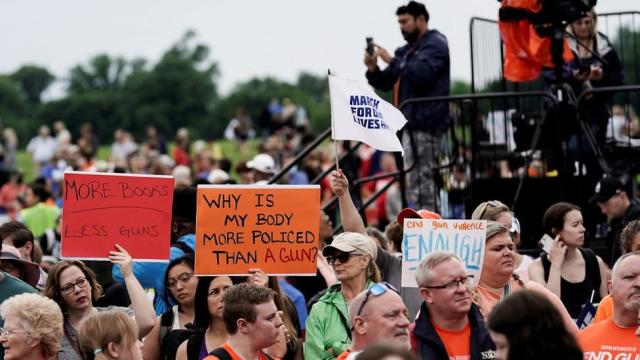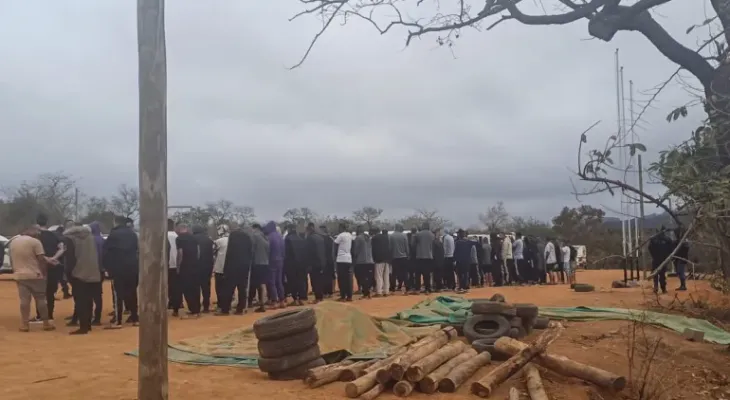
Those taking part at the hundreds of marches carried slogans like “I want freedom from getting shot”.
US President Joe Biden backed the protests, calling on Congress to “pass common sense gun safety legislation”.
Despite this the chances of legal change are likely to be quashed by Republicans.
Nineteen children and two adults were killed in the 24 May shooting at Robb Elementary in Uvalde, Texas.
That attack, and another days earlier in Buffalo, New York, in which 10 people were killed, has led to renewed calls for action on gun control in the US.
On Saturday, gun safety group March For Our Lives – founded by survivors of the 2018 Parkland school shooting in Florida – said some 450 rallies would be held across the country, including Washington DC, New York, Los Angeles and Chicago.
The group said it would not let politicians “sit back” as people continue to die.
March For Our Lives (MFOL) said political leaders’ inaction was killing Americans.
“We will no longer allow you to sit back while people continue to die,” Trevon Bosley, a MFOL board member, said in a statement.
Speaking to protesters in Washington DC, one of the survivors of the Parkland shooting, David Hogg, said the killings of children in Uvalde “should fill us with rage and demands for change, not endless debate, but demands for change, now.”
Garnell Whitfield, whose 86-year-old mother was killed in the racially-motivated shooting in Buffalo, New York on 14 May, told crowds in Washington: “We are here to demand justice.
“We are here to stand with those who are bold enough to demand sensible gun legislation.”
Among other policies, MFOL has called for an assault weapons ban, universal background checks for those trying to purchase guns and a national licensing system, which would register gun owners.
The theme of this rally is: This time it will be different – and that’s what the thousands of protesters here in Washington DC are chanting.
Teenagers Calvin Chrisfield and Ani Arzoumanian have travelled from Maryland. They tell me that members of their school sports teams have had to take shelter from gun attacks while at games. They are more hopeful than optimistic about change, but say addressing gun violence is the “biggest push” of their generation “because we’re the ones dying”.
Hafiza Kazi is holding a sign that says: “My Muslim uncle gets more background checks than a gun.”
She was born on the day of the mass shooting at Columbine high school. Her friend Annie DiGuglielmo believes there is new momentum now: She says she’s seen some Republicans who’ve previously been against gun control change their mind.
And Lindsey Erin is a primary school teacher who is adamant that teachers should not be armed, as advocated by some Republicans.
“Children hug you, they grab things on your shirt… it’s a recipe for absolute disaster.”
The first MFOL protest was held days after the Marjory Stoneman Douglas high school shooting in Parkland, Florida, in 2018, in which 14 students and three adults were killed. Organisers say it was the largest gun safety rally in one day in US history, and thousands of students across the country left their classrooms to join the demonstrations.
President Biden, a Democrat who this month urged Congress to ban assault weapons, expand background checks and implement other gun control measures, said he supported Saturday’s protests.
“Today, young people around the country once again march with @AMarch4OurLives to call on Congress to pass common sense gun safety legislation, supported by the majority of Americans and gun owners,” he tweeted.
“I join them by repeating my call to Congress: do something.”
In recent weeks, a bipartisan group of Senate negotiators have vowed to hammer out a gun control deal, though they have yet to reach an agreement.
Their effort is focused on relatively modest changes, such as incentivising states to pass “red flag” laws that allow authorities to keep guns from individuals deemed a danger to others.
This week the US House of Representatives voted through a series of measures regulating the sale of guns.
But Republican opposition in the Senate means the bill has little chance of entering law.






